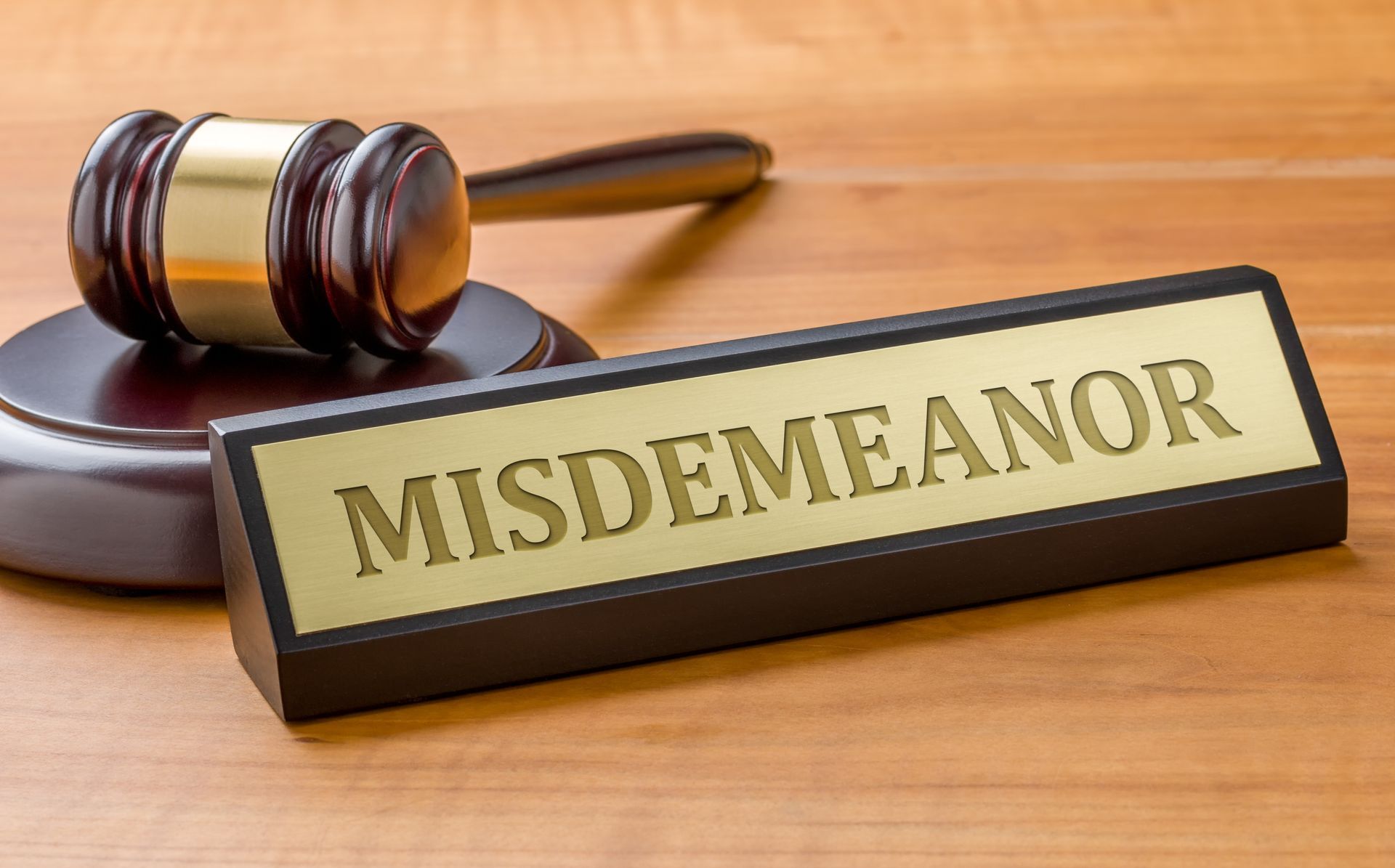Our Legal Blog
Your Resource For Legal Information

30 Jan, 2024
The Seriousness of Weapon Charges Weapon charges in Michigan carry severe consequences that can impact your life in significant ways. Whether you're facing charges related to illegal possession, concealed carry violations, or even assault with a deadly weapon, it's essential to take these charges seriously. The potential penalties include hefty fines, probation, jail time, and a permanent criminal record, which can affect your employment prospects, housing options, and personal relationships. The Role of a Weapon Charges Defense Attorney When facing weapon charges, having an experienced defense attorney by your side can make all the difference. Here are some crucial ways they can assist you: 1. Expert Legal Knowledge and Guidance A weapon charges defense attorney specializes in Michigan's firearm laws and possesses in-depth knowledge of the legal system's intricacies. They will evaluate your case, identify any potential defenses, and provide sound legal advice tailored to your specific situation. Their expertise ensures that you understand the charges against you and the possible outcomes, allowing you to make informed decisions throughout the legal process. 2. Protection of Your Rights One of the primary roles of a defense attorney is to protect your constitutional rights. They will ensure that law enforcement and prosecutors have followed proper procedures and that no evidence was obtained unlawfully. If your rights were violated during the arrest, search, or interrogation process, your attorney will aggressively pursue the exclusion of such evidence from your case. 3. Building a Strong Defense Strategy A weapon charges defense attorney will meticulously examine the evidence against you, seeking any weaknesses or inconsistencies that can be used to challenge the prosecution's case. They will gather additional evidence, interview witnesses, and consult with experts if necessary to build a robust defense strategy tailored to your circumstances. This may involve presenting alternative explanations, asserting self-defense, or challenging the credibility of prosecution witnesses. 4. Negotiating with Prosecutors In many cases, a skilled defense attorney can negotiate with prosecutors to secure a favorable outcome. They will leverage their knowledge of the law, familiarity with the local courts, and relationships with prosecutors to explore potential plea agreements, reduced charges, or alternative sentencing options. While every case is unique, having an attorney who can skillfully navigate these negotiations is essential to achieving the best possible outcome. 5. Representation in Court If your case proceeds to trial, a weapon charges defense attorney will vigorously advocate on your behalf in the courtroom. They will cross-examine witnesses, present evidence, and deliver persuasive arguments to challenge the prosecution's case. Their goal is to cast reasonable doubt on the charges against you, ultimately securing an acquittal or minimizing the penalties you may face. The Importance of Acting Swiftly When facing weapon charges, time is of the essence. It's critical to consult with a defense attorney as soon as possible to ensure the preservation of evidence, protect your rights during police questioning, and begin building a strong defense strategy. Waiting too long to seek legal representation can jeopardize your case and limit the available defense options. Choose an Experienced Weapon Charges Defense Attorney When your future is at stake, you deserve the best possible defense. Look for a weapon charges defense attorney with a proven track record, experience in Michigan's firearm laws, and a commitment to protecting their clients' rights. Schedule a consultation to discuss your case, ask questions about their experience and approach, and ensure they are the right fit for your needs. = If you're facing weapon charges in Michigan, enlisting the help of a skilled defense attorney is essential to protect your rights, navigate the legal system, and achieve the best possible outcome. Their expertise, guidance, and tenacity will ensure that you have a robust defense strategy tailored to your unique circumstances. Remember, you don't have to face these charges alone. Take action today and secure the strong legal representation you deserve.

21 Dec, 2023
When it comes to employment, a criminal conviction can be a significant obstacle for candidates. Many employers are concerned about potential risks and liability, particularly related to sensitive positions or those that involve direct interaction with clients or the public. However, the question of what employers can ask about criminal convictions during the hiring process is not always clear-cut. As an expert in employment law, I am often asked by clients: What can an employer ask in an interview? The answer depends on various factors, including your location, the position you are seeking, and other legal considerations. In this blog post, we'll explore the topic of criminal convictions and employment in Michigan. We'll tackle common questions such as whether or not an employer is allowed by law to ask about your criminal convictions, if you are required to disclose that information, how the employer can use your criminal history when making hiring decisions, and how an attorney can help you navigate this complex terrain. What can an employer ask in an interview? Employers in Michigan are limited in their ability to ask candidates about criminal convictions. Under the Michigan Handgun Act, employers cannot ask job applicants whether they have a conviction for a minor marijuana offense. Additionally, the Michigan Civil Rights Commission has offered guidelines that state an employer should not ask applicants about convictions until the applicant has received a conditional offer of employment. At that point, the employer can ask about felony convictions, but not misdemeanor or traffic violations. Is your employer allowed to ask? The answer to this question depends on which state you are in. In Michigan, employers are allowed to ask about criminal convictions, but they are limited in the types of convictions they can inquire about and when they can do so (as noted above). Failure to comply with these limitations can lead to discrimination lawsuits. Are you required to disclose that information? If an employer in Michigan asks you about your criminal convictions, you are generally required to disclose that information truthfully. However, if the employer is asking about misdemeanor or traffic violations, you can answer "no." This is not true for job applications in Michigan City, where you must disclose even minor traffic violations. How can the employer use that information? Employers in Michigan are generally forbidden from using your criminal history as an automatic reason not to hire you. Instead, they must weigh several factors, including the nature of the offense, when it occurred, and its relation to the job. Typically, employers must have a legitimate business reason for denying someone employment based on their criminal history. Your attorney may be able to help identify if your employer is assessing your criminal history in this way. How can an attorney help me? An attorney can help you navigate the complex legal terrain surrounding the use of criminal convictions in employment decisions in Michigan. If you have a criminal history, getting an attorney involved early in the hiring process can help ensure that you are not unfairly denied employment and that your rights are protected. Additionally, if you have faced discrimination in the hiring process due to your criminal history, an attorney can help you file a complaint. If you have a criminal history and are seeking employment in Michigan, there are limitations to what an employer can ask and how they can use that information. By understanding your rights and working with an attorney who is well-versed in employment law, you can help protect yourself from discrimination and unfair treatment during the hiring process. Always remember to be honest, but also to be informed about your rights, and don't be afraid to seek legal advice if you need it.

01 Nov, 2023
Filing for bankruptcy can be an overwhelming process, especially when navigating through the complex and confusing legal system. In chapter 13 cases, it is essential to have a bankruptcy attorney by your side to ensure that all your legal proceedings run smoothly. While anyone can file for chapter 13 bankruptcy without an attorney, having legal representation can make all the difference in the outcome. In this blog post, we'll discuss the primary role of a bankruptcy attorney in chapter 13 cases and why you should hire one when filing. 1. Ensure Eligibility: Chapter 13 bankruptcy is not available to every debtor, and an attorney can help determine if you are eligible for chapter 13 bankruptcy. Your attorney will analyze your debts, income, and expenses and assist you in creating a feasible repayment plan. If your financial circumstances do not meet chapter 13 requirements, your attorney may suggest other options, such as chapter 7 bankruptcy. 2. Legal Guidance: The bankruptcy process involves a lot of legal proceedings, documentation, and court appearances. An attorney can guide you throughout the process, explaining the legal jargon, and ensuring that you are aware of your rights and obligations. Having an attorney by your side will give you the peace of mind that you are making informed decisions and that your legal rights are being protected. 3. Represent You in Court: A bankruptcy attorney can represent you in court-related matters and ensure that your case is appropriately handled. This representation includes filing court documents, negotiating with creditors, attending court hearings, and presenting arguments on your behalf. Your attorney can also answer questions from the bankruptcy trustee and provide evidence to support your case. 4. Help Avoid Mistakes: One significant advantage of having a bankruptcy attorney is that they can help you avoid making mistakes that could lead to the dismissal of your case. Dismissals often occur when debtors fail to follow court orders or provide the required information to the bankruptcy trustee. An attorney can ensure that you are following all necessary steps, preventing the dismissal of your case. 5. Speed Up the Process: Filing for bankruptcy can be a lengthy and time-consuming process. Hiring an attorney can help speed up the process by ensuring that paperwork is filed correctly and quickly. This is particularly important because the sooner you complete the process, the sooner you can begin rebuilding your credit. Filing for bankruptcy is a complicated process that requires careful navigation through the legal system. Chapter 13 bankruptcies, in particular, are a complicated legal process. While it may be tempting to file for bankruptcy without legal representation to save money, hiring a bankruptcy attorney can make all the difference in the outcome. An attorney can help ensure eligibility, guide you through the legal process, represent you in court, and help you avoid making any mistakes that may result in the dismissal of your case. If you are considering filing for chapter 13 bankruptcy in Michigan, schedule a consultation with a bankruptcy attorney today. Their guidance and representation can help take the stress out of the filing process and provide you with peace of mind that you are making informed decisions.

By Scott Neuman
•
29 Sep, 2023
White collar crimes, such as fraud and embezzlement, are threatening Michigan’s financial stability. The state has one of the highest rates of financial fraud in the U.S., with reports of fraudulent activities increasing year by year. Fortunately, the legal system is determined to tackle financial crimes, and the state has taken a hard stance on white-collar crimes. However, understanding how white-collar crimes are prosecuted can be complicated. In this blog, we’ll discuss the legal process for prosecuting white-collar crimes, the penalty for such offenses, and how an attorney can help you if you’re facing these charges. White-collar crimes are often highly sophisticated and intricate, often carried out by individuals in positions of power or trust, and they can have devastating consequences on the individuals and organizations they harm. Due to the complexity of such crimes, the legal process for prosecuting them is often complicated. Typically, the prosecution needs to establish the accused’s intent to commit the crime, as well as proving the act of committing the crime itself. Unlike other crimes, like assault or theft, the prosecution will usually need to present a substantial amount of evidence to prove the accused’s intent. This evidence may include emails or other communications, financial statements, and other documentation to prove that the accused had the intention to commit the crime. Determining the penalty for white-collar crimes can vary depending on the severity and complexity of the offense. In Michigan, the severity of white-collar crimes are considered by two main criteria; the financial loss incurred, and the nature of the crime carried out. Thus, a few mitigating circumstances or a minimal financial loss may lead to a misdemeanor charge. On the other hand, larger financial losses and severe crimes may lead to a felony charge. Aside from possible prison terms, the offender could also be subjected to a significant fine. Having an experienced attorney by your side can help you combat white-collar crime charges and navigate the legal system professionally. A reputable attorney can help you better understand your options and devise a strategy to help you minimize your legal exposure. Also, a good attorney will be able to pick apart the prosecution’s evidence to argue the intent to commit the crime wasn’t evident beyond a reasonable doubt. Prosecuting white-collar crimes can be a complicated process, with many different factors to consider before arriving at an appropriate penalty. Having an experienced attorney can make a tremendous difference in understanding the prosecution process and diminishing your legal exposure. If you’re facing white-collar crime charges, reach out to a qualified attorney for professional advice and representation. They can guide you through the legal process and help you fight these charges effectively. don't hesitate to contact us today to get started.

By Scott Marshall
•
31 Aug, 2023
Have you ever heard the term misdemeanor before? If so, you may be wondering what it means. A misdemeanor is a type of criminal offense that is considered less serious than a felony. However, that doesn't mean that misdemeanors are not punishable or that they don't have serious consequences. As a Michigan resident, it's important to understand what a misdemeanor is, how it is classified, and what the penalties can be if convicted. 1. What is a Misdemeanor? A misdemeanor is a type of criminal offense that is considered less serious than a felony. Examples of misdemeanor offenses include petty theft, disorderly conduct, minor drug offenses, and assault. One of the main differences between a misdemeanor and a felony is the level of punishment. Felonies are punishable by long-term imprisonment, while misdemeanors can be punished with short-term sentences, fines, or community service. 2. Different Types of Misdemeanors in Michigan Michigan divides misdemeanors into three different categories based on the severity of the offense. These categories are: - Class A Misdemeanors: These are the most serious misdemeanors and are punishable with up to one year in jail and fines of up to $2,000. Examples of class A misdemeanors include DUI and domestic violence. - Class B Misdemeanors: These are considered less serious than class A misdemeanors and are punishable with up to 90 days in jail and fines of up to $500. Examples of class B misdemeanors include prostitution and possession of marijuana. - Class C Misdemeanors: These are the least serious misdemeanors and are punishable with up to 30 days in jail and fines of up to $250. Examples of class C misdemeanors include disorderly conduct and trespassing. 3. Penalties for a Misdemeanor The penalties for a misdemeanor conviction can vary widely depending on the severity of the offense. In addition to imprisonment and fines, other common penalties for misdemeanors include probation, community service, and mandatory counseling or treatment. Misdemeanor convictions can also have other serious consequences, such as a criminal record that can impact your ability to find employment or housing. 4. Hiring a Criminal Defense Attorney If you have been charged with a misdemeanor in Michigan, it's important to seek the guidance of a criminal defense attorney. An experienced attorney can help you understand the charges, assess your options, and develop a strong defense strategy. With the right representation, you may be able to avoid conviction, minimize the penalties, or negotiate a plea bargain. 5. Importance of Understanding Misdemeanors Understanding what a misdemeanor is, how it is classified, and what the potential consequences are can help you make informed decisions and avoid situations that could lead to criminal charges. If you are charged with a misdemeanor, knowledge is power. The more you understand about your charges and your legal options, the better equipped you will be to make informed decisions and protect your rights. Misdemeanors are a less serious type of criminal offense than felonies. They can be classified into different categories based on their severity and can result in a range of penalties, including imprisonment, fines, and loss of civil liberties. If you are facing misdemeanor charges in Michigan, it's important to seek the guidance of an experienced criminal defense attorney and understand your legal options. With the right representation, you may be able to minimize the consequences of your charges and move on with your life.
Schedule Free Case Evaluation
Contact us now!
Homepage FCE Form
Thank you for contacting us.
We will get back to you as soon as possible.
We will get back to you as soon as possible.
Oops, there was an error sending your message.
Please try again later.
Please try again later.
By submitting this form, you agree to be contacted by our law firm, either by phone, text or by email.
Practice Areas
Office Location
2196 Commons Pkwy
Okemos, MI 48864
The information on this website is for general information purposes only. Nothing on this site should be taken as legal advice for any individual case or situation. This information is not intended to create, and receipt or viewing does not constitute an attorney-client relationship.
© Copyright 2022 | All Rights Reserved | Michigan Attorney Don E. Burch | Powered By Convert IT Marketing | Privacy Policy





